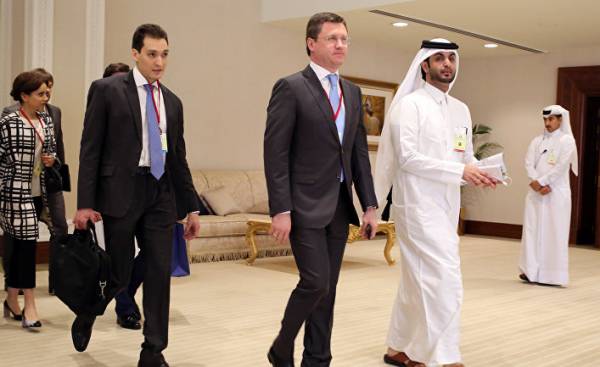
Saudi Arabia wants growth in oil prices to around $60 per barrel this year, said five sources of OPEC and oil industry.
This mark, which is considered the largest producer in OPEC and its partners in the Persian Gulf — UAE, Kuwait and Qatar, will attract investment in new fields, but will not lead to a surge in shale oil production in the United States, said the sources.
OPEC, Russia and other oil producers in 2016, agreed to cut production by about 1.8 million barrels per day from January 1. The first reduction in eight years focused on the growth of prices and the elimination of excess supply.
Brent crude rose by more than 14 percent since the signing of the Pact, but was still trading near $56 per barrel, despite a record performance of the agreement by OPEC and outside the organization.
OPEC representatives have repeatedly said that the organization is not seeking a specific oil price in the focus of its attention — the reduction of world oil reserves and the restoration of balance in the market.
However, behind closed doors in Riyadh and partners in OPEC in the Persian Gulf say they hope for the continued growth of oil prices because the low cost is putting pressure on their financial condition and raised concerns about the lack of inventory in the future.
However, they don’t want to keep prices high enough to encourage producers of shale oil in the United States, which significantly hurt the fall oil prices, again to increase production. Technology development helps them to adapt more quickly to fluctuations in oil prices.
“They (the Saudis) want the oil cost $60 by the end of this year. It is good for investment (in oil),” said a source from the oil industry in the Persian Gulf, familiar with the situation.
Another source in the industry outside of the Persian Gulf said that “OPEC and especially the Saudis want prices” not only for investment but also because Riyadh wants to sell a stake in state oil giant Saudi Aramco.
Since mid-2014 have been cancelled or postponed oil projects worth more than $1 trillion. The decline in investments in future oil projects has fueled concern about a possible shortage of stocks and a sharp jump in prices.
To develop oil deposits prior to mining is required for about four years, while American shale oil can be extracted a few months after appropriate decisions.
“In General price is about $60 this year will be satisfactory. It does not lead to such a large growth of shale oil production,” said one source in OPEC, noting that the production of shale oil is expected to increase by approximately 300,000 barrels per day this year.
To absorb the oil
American shale oil miners started to increase production again when the price of oil reached $50 per barrel in may 2016 after two years of decline due to saturation of world markets, observed since mid-2014.
The number of drilling rigs in the US increased by more than 280 since the end of may, and the energy information Administration (EIA)predicts that production in the domestic U.S. market will increase by 430.000 barrels per day in the period from December 2016 to December 2017.
According to another source in OPEC, shale oil miners who find themselves previously under pressure, can be careful not to rapidly increase production in response to price changes, despite the development of technology.
The third source of OPEC doubts that prices are unlikely to rise to $60 or higher in the current year due to continuing market saturation.
According to him, even if the growth of shale oil production will exceed 300,000 barrels per day, the market can absorb, if the increase will occur in winter months when demand reaches its maximum.
A source in the oil industry in the Persian Gulf, said OPEC and countries outside the organization can extend the agreement on the limitation of production, because the return to the policy of unrestricted extraction may lead to falling prices and, once again, to destabilize the market.
“If we come back to the race for increased production, then we’ve achieved nothing, and the prices again will fall,” he said.







